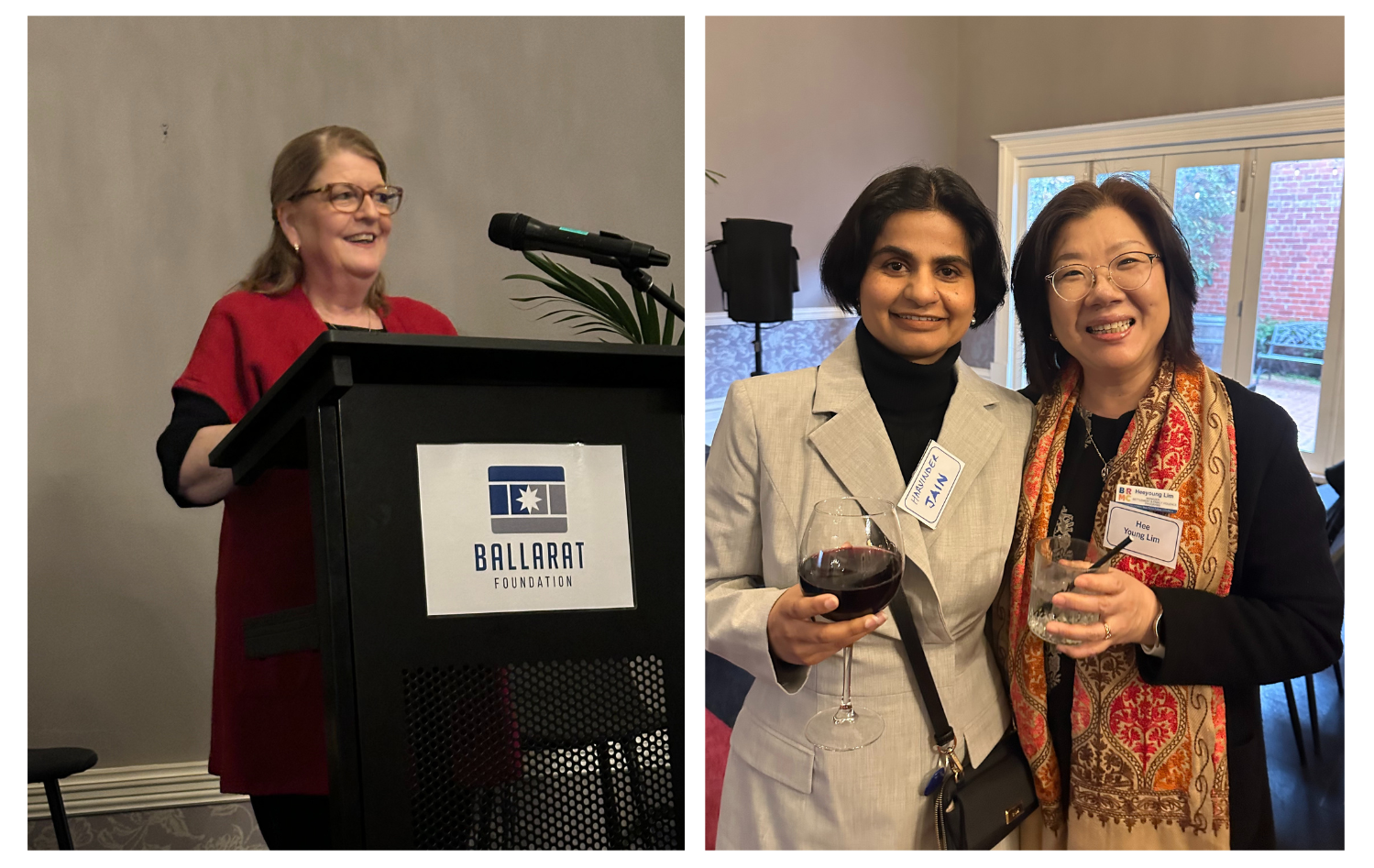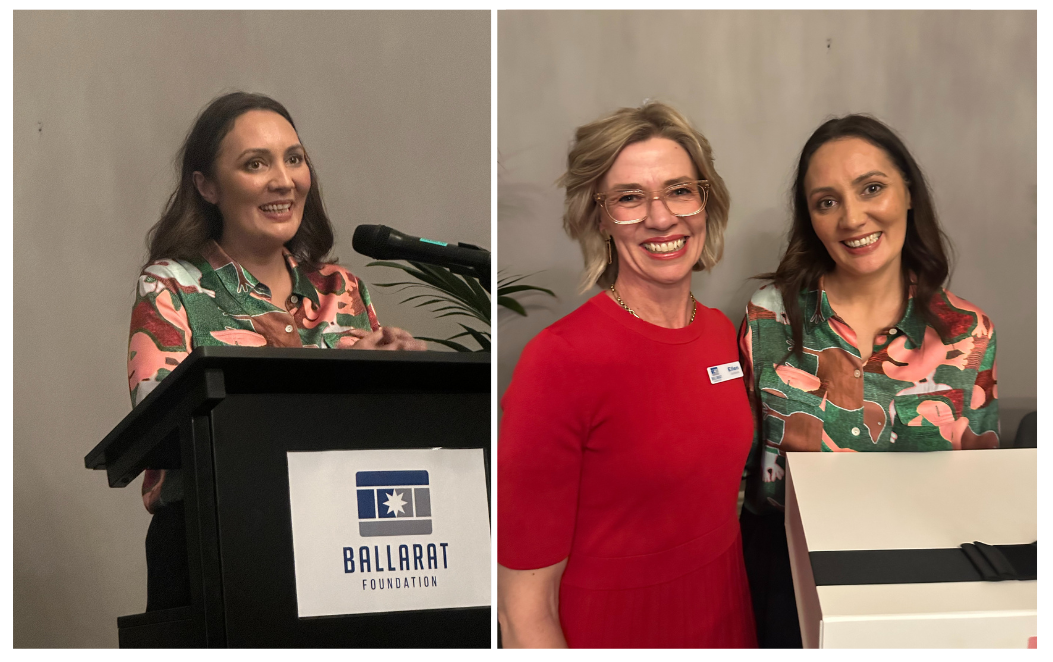Last night, members and supporters of the Ballarat Women’s Fund gathered for an evening of powerful storytelling, connection and inspiration.
The annual event is more than a chance to come together – it is an opportunity to hear from women who are leading change in our communities, to share in their courage, and to be reminded of how collective giving can give hope, empower action and spark long-term change for women and families.
Ellen Jackson, Chairperson of the Ballarat Foundation Board of Directors, opened the night by welcoming guests and introducing the three speakers whose insights and experiences captivated the audience.
Suzanne Ryan-Evers – Ballarat Regional Multicultural Council, Project Sitara
Recipients of this year's Ballarat Women's Fund grant, Suzanne shared an update onProject Sitara, an initiative that builds safer pathways for women from culturally and linguistically diverse backgrounds who face additional barriers when seeking support for family and sexual violence. “Family violence does not discriminate, but women from culturally and linguistically diverse backgrounds often face additional barriers – language, isolation and stigma,” she explained.
The program, beginning with the Hindi-speaking community, strengthens networks, builds trust, and trains local women as leaders who can guide others to safety. “This project is about building trust and training women who are already leaders in their communities, giving them the tools and support to safely guide others,” Suzanne said. Already, 13 women have signed on and workshops are underway. The project has been met with gratitude and enthusiasm, and Suzanne expressed thanks to the Ballarat Women’s Fund donors who voted to fund the program, making this vital work possible.
Below: Suzanne Ryan-Evers and Harvinder Jain and Hee Young Lim from Project Sitara, BRMC.

Bridget Brennan – ABC Journalist and Presenter
Bridget, ABC News Morning co-host, spoke candidly about her career and role in driving change not only to create representation of Indigenous voices within the organisation, but externally about the importance of truth-telling, cultural safety and representation in the media. She shared stories from communities across Australia, highlighting both the devastating realities of family violence and the resilience of women who lead change.
“We had to push ourselves to do things differently – to take the time to sit, listen and build trust with people who have often been let down by the media,” she said, reflecting on the need to rebuild relationships between journalists and communities.
One of her most challenging investigations was into missing and murdered Indigenous women in Australia. “There was no national data – we had to piece it together ourselves from coronial reports, police files and media clippings. It showed not only the scale of loss, but also the silence surrounding it,” Bridget said.
She also emphasised the importance of balance in storytelling: “Alongside stories of tragedy, I always try to tell stories of humour, resilience and leadership, because visibility matters. It makes a difference when Indigenous people see themselves reflected on national platforms.”
Her call to action was clear: “Culture change requires honesty and follow-through. Leaders can’t be afraid to acknowledge shortcomings, to listen, and then to act.”
Bridget’s honesty and her depth of experience left the audience moved and inspired, offering a reminder of the power of storytelling to create accountability and hope.
Below: Bridget Brennan speaking and Ellen Jackson, Chairperson of the Ballarat Foundation Board of Directors with Bridget.

Helen Bolton – Respect Victoria
Helen introduced the Ballarat Saturation Model, a whole-of-community approach to preventing family and gender-based violence that is being developed here in Ballarat. She began by honouring the lives of women lost to family violence and then praised the community for its leadership. “What makes Ballarat stand out is the collective commitment to action: workplaces, schools, sporting clubs and community groups all saying ‘no more’,” she said.
Helen explained that the Ballarat Saturation Model works by ensuring consistent, reinforcing messages are delivered everywhere – schools, workplaces, sporting clubs, health services and homes – so that the call for respect, equality and non-violence becomes part of everyday life. “The Saturation Model is about flooding a community with reinforcing messages – everywhere people turn, they encounter the same call for equality, respect and non-violence,” Helen said.
She urged attendees to be active participants, not bystanders, and described the progress in Ballarat as inspiring and a model that could drive long-term reductions in violence across the region and beyond.
Below: Supporters and donors of the Ballarat Women's Fund.
.png)
Through collective giving, change is possible
The Ballarat Women’s Fund is built on the belief that when we come together, we can create a safer, fairer and more inclusive future for women and families in Ballarat. Thank you to Bridget, Helen and Suzanne for their insightful and inspiring words, and to those who came out to support the event.
If you are interested in being part of the Ballarat Women's Fund giving circle CLICK HERE for more information.
.png)
.png)
.png)